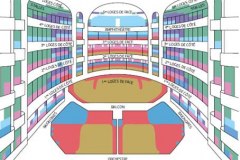Castor and Pollux
Mo | Tu | We | Th | Fr | Sa | Su |
Synopsis
The synopsis is based on 1737 version
Prologue
The allegorical prologue is unrelated to the main story. It celebrates the end of the War of the Polish Succession, in which France had been involved. In the prologue, Venus, goddess of love, subdues Mars, god of war, with the help of Minerva. In the 1754 revision, the prologue was eliminated.
Act 1
Background note: Castor and Pollux are famous heroes. Despite being twin brothers, one of them (Pollux) is immortal and the other (Castor) is mortal. They are both in love with the princess Telaira (Télaïre), but she loves only Castor. The twins have fought a war against an enemy king, Lynceus (Lyncée) which has resulted in disaster: Castor has been slain. The opera opens with his funeral rites. Telaira expresses her grief to her friend Phoebe (Phébé) in Tristes apprêts, one of Rameau's most famous arias. Pollux and his band of Spartan warriors interrupt the mourning bringing the dead body of Lynceus who has been killed in revenge. Pollux confesses his love for Telaira. She avoids giving a reply, instead asking him to go and plead with his father Jupiter, king of the gods, to restore Castor to life.
Act 2
Pollux expresses his conflicting emotions in the aria Nature, amour, qui partagez mon coeur. If he does what Telaira says and manages to persuade Jupiter to restore his brother to life, he knows he will lose the chance to marry her. But he finally yields to her pleas. Jupiter descends from above and Pollux begs him to bring Castor back to life. Jupiter replies he is powerless to alter the laws of fate. The only way to save Castor is for Pollux to take his place among the dead. Pollux, despairing that he will never win Telaira, decides to go to the Underworld. Jupiter tries to dissuade him with a ballet of the Celestial Pleasures led by Hebe, goddess of youth, but Pollux is resolute.
Act 3
The stage shows the entrance to the Underworld, guarded by monsters and demons. Phoebe gathers the Spartans to prevent Pollux from entering the gate of the Underworld. Pollux refuses to be dissuaded, even though Phoebe declares her love for him. When Telaira arrives and she sees Pollux's true love for her, Phoebe realises her love will be unrequited. She urges the demons of the Underworld to stop him entering (Sortez, sortez d'esclavage/Combattez, Démons furieux). Pollux fights the demons with the help of the god Mercury and descends into Hades.
Act 4
The scene shows the Elysian fields in the Underworld. Castor sings the aria Séjours de l'éternelle paix: the beautiful surroundings cannot comfort him for the loss of Telaira, neither can a Chorus of Happy Spirits. He is amazed to see his brother Pollux, who tells him of his sacrifice. Castor says he will only take the opportunity to revisit the land of the living for one day so he can see Telaira for the last time.
Act 5
Castor returns to Sparta. When Phoebe sees him, she thinks Pollux is dead for good and commits suicide so she can join him in the Underworld. But Castor tells Telaira he only plans to remain alive with her for a single day. Telaira bitterly accuses him of never having loved her. Jupiter descends in a storm as a deus ex machina to resolve the dilemma. He declares that Castor and Pollux can both share immortality. The opera ends with the fête de l'univers ("Festival of the Universe") in which the stars, planets and sun celebrate the god's decision and the twin brothers are received into the Zodiac as the constellation of Gemini.
Program and cast
Lyric tragedy with a prologue and five acts (1737)
Creative team
Jean-Philippe Rameau - Music
Pierre-Joseph Bernard - Libretto
Teodor Currentzis - Conductor
Vitaly Polonsky - Chorus master
Peter Sellars - Director
Camille Assaf - Costume design
James F. Ingalls - Lighting design
Alex MacInnis - Video
Antonio Cuenca Ruiz - Dramaturgy
Cast
Jeanine De Bique - Télaïre
Stéphanie d'Oustrac - Phébé
Reinoud Van Mechelen - Castor
Marc Mauillon - Pollux
Claire Antoine - Minerva, A Follower of Hébé
Laurence Kilsby - Love, The High Priest, The Athlete
Orchestre et Choeurs Utopia
Language : French
Surtitle : French / English
Duration : 3h20 with 2 intervals
Opening
First part - 60 minutes
Intermission 20 minutes
Second part - 55 minutes
Intermission 20 minutes
Third part - 45 minutes
End
Paris Opera Palace Garnier
.jpg) RM Europa Ticket GmbH is an officially accredited ticket reseller of/by Opera National de Paris.
RM Europa Ticket GmbH is an officially accredited ticket reseller of/by Opera National de Paris.
Agency number: 4848428
The Paris Opera (French: Opéra de Paris, or simply the Opéra) is the primary opera company of Paris. It was founded in 1669 by Louis XIV as the Académie d'Opéra and shortly thereafter was placed under the leadership of Jean-Baptiste Lully and renamed the Académie Royale de Musique. Classical ballet as we know it today arose within the Paris Opera as the Paris Opera Ballet and has remained an integral and important part of the company. Currently called the Opéra national de Paris, it primarily produces operas at its modern 2700-seat theatre Opéra Bastille which opened in 1989, and ballets and some classical operas at the older 1970-seat Palais Garnier which opened in 1875. Small scale and contemporary works are also staged in the 500-seat Amphitheatre under the Opéra Bastille.
The company's annual budget is in the order of 200 million euros, of which 100 million come from the French state and 70 million from box office receipts. With this money, the company runs the two houses and supports a large permanent staff, which includes the orchestra of 170, a chorus of 110 and the corps de ballet of 150
Each year, the Opéra presents about 380 performances of opera, ballet and other concerts, to a total audience of about 800,000 people (of which 17% come from abroad), which is a very good average seat occupancy rate of 94%In the 2012/13 season, the Opéra presents 18 opera titles (two in a double bill), 13 ballets, 5 symphonic concerts and two vocal recitals, plus 15 other programmes. The company's training bodies are also active, with 7 concerts from the Atelier Lyrique and 4 programmes from the École de Danse.
The Palais Garnier is a 1,979-seat opera house, which was built from 1861 to 1875 for the Paris Opera. It was originally called the Salle des Capucines because of its location on the Boulevard des Capucines in the 9th arrondissement of Paris, but soon became known as the Palais Garnier in recognition of its opulence and its architect, Charles Garnier. The theatre is also often referred to as the Opéra Garnier, and historically was known as the Opéra de Paris or simply the Opéra, as it was the primary home of the Paris Opera and its associated Paris Opera Ballet until 1989, when the Opéra Bastille opened at the Place de la Bastille. The Paris Opera now mainly uses the Palais Garnier for ballet.
The Palais Garnier is "probably the most famous opera house in the world, a symbol of Paris like Notre Dame Cathedral, the Louvre, or the Sacré Coeur Basilica." This is at least partly due to its use as the setting for Gaston Leroux's 1910 novel The Phantom of the Opera and, especially, the novel's subsequent adaptations in films and Andrew Lloyd Webber's popular 1986 musical. Another contributing factor is that among the buildings constructed in Paris during the Second Empire, besides being the most expensive, it has been described as the only one that is "unquestionably a masterpiece of the first rank." This opinion is far from unanimous however: the 20th-century French architect Le Corbusier once described it as "a lying art" and contended that the "Garnier movement is a décor of the grave".
The Palais Garnier also houses the Bibliothèque-Musée de l'Opéra de Paris (Paris Opera Library-Museum). Although the Library-Museum is no longer managed by the Opera and is part of the Bibliothèque nationale de France, the museum is included in unaccompanied tours of the Palais Garnier.
Performances: Su 26 May 2024,
Performances: Th 16 May 2024,
Performances: Mo 13 May 2024,
Performances: Th 16 May 2024,
Performances: Su 12 May 2024,
Performances: Su 12 May 2024,

 EN
EN DE
DE IT
IT FR
FR ES
ES RU
RU JP
JP RO
RO
 Seating plan
Seating plan 




